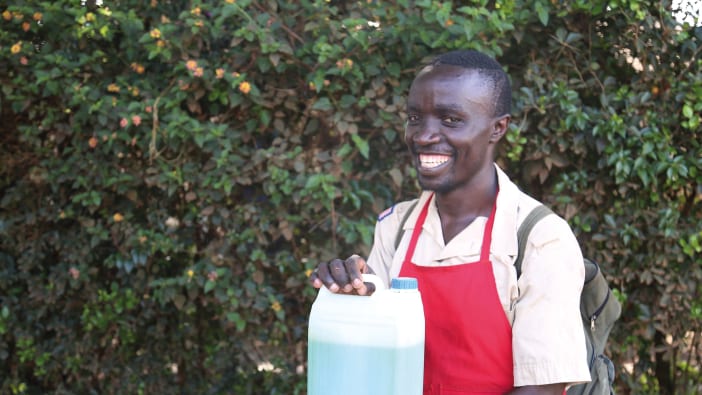by Keith Wright.
The idea of having community based activities has become very fashionable in development work and especially in primary health care. The term community based was originally used to try to describe health development work that happens in a community far away from a health unit. Up to that time the services of a clinic or a mobile clinic were the closest way in which health care came to the homes of people. The clinics were organised by the health service and carried out their programmes according to their own agenda. This system did not have the opportunity to deal directly with the root causes of the majority of the health problems seen at these clinics. As a result, there was little reduction in the queues.
The idea of working directly in and with communities, quickly gained interest with donors and health personnel. It was seen as a natural development to increase the prevention side of primary health care. However, with the widespread use of the term community based have come many definitions of this term.
Commonly there are two types of community based health care programme. They share the same name but they work in very different ways.
Community Located
The health staff work in the community, but follow the plans and procedures of the programme which have been pre-determined in the Project office, far away from the community. The community members are expected to participate with the plans of the programme. The important decisions are all made outside the community in the Project office. This type of community based programme can be called community located.
Many health care programmes are community located in their method of working. This is especially true for programmes which have considerable financial backing from outside agencies. This backing may come with many ‘targets’ and inputs that require tight pre-planning that greatly restrict flexibility. For example...
- The project insists on continuing with its plans to encourage people to build latrines, when the people’s major problem is the broken bridge.
- The project plans to train 200 CHWs in a year, but less than 50 volunteer. To reach this target, the project offers attractive incentives to encourage people to volunteer.
Community Controlled
The health programme does not come with strict pre-determined plans but has the flexibility to respond to the needs of the community. These needs are identified and described by the community members - not by outsiders. Now the programme is participating with the community. The role of the programme is to strengthen the capacity of the community to control and run its own community based health care programme. This approach can be called community controlled.
Community controlled health care programmes have the advantage of developing preventive work that is...
- supported by the community with outside services offering their services in partnership
- working on problems identified by that community
part of on-going action within the community to carry out - development work which attacks the root causes of ill health.
Support that makes a real difference
Everyone working in community based health care is genuinely concerned to ‘improve’ health and to maintain those improvements. To enable this to happen, the communities will need:
- the skills and encouragement to take control
- the skills to prevent preventable problems
- the skills to carry out local development activities.
They will not be able to do this alone. They will need the inputs and encouragement of outside groups.
Programmes can offer the following in a genuine co-operative partnership:
- help in identifying the problems
- encouragement that change is possible
- leadership training
- skills training
- support for plans made by the community
- skills in managing and organising community work
- planning policies that help all the above to happen.
This is not so difficult. What it requires from the programme staff and outside agencies is the courage to trust and the belief that what we cannot do alone, we can do together.
Keith Wright worked in Uganda for eight years with CBHC, training community development staff and decision makers. He now works as the Training Advisor for ITDG, Myson House, Railway Terrace, Rugby, CV21 3HT, UK.
This article was based on part of the Facilitators Manual for the Training of Trainers series. This excellent resource is made up of 4 books - a total of 500 pages - covering a whole range of subjects for the teaching of trainers - the central people in CBHC development. Much of the material is specifically designed for use in workshops - with aims, material required, case studies, discussion questions and conclusions. Though Ugandan based, the series would be readily adaptable to other countries. All contents have been thoroughly tried and tested over twelve years of workshops in Uganda, and are highly recommended.









